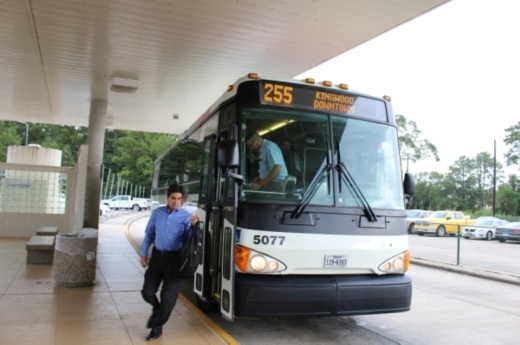METRO also announced that local bus routes will begin operating on a Saturday schedule starting March 23. Bus passengers will also be required to enter buses from the rear door at this time.
The announcement came on the heels of a separate METRO initiative that began March 17 to encourage social distancing among riders.
METRO officials said they have reduced capacity on local buses, light rail and METROLift to 50% to lessen crowding. METRO has also increased the frequency of buses on some of the more heavily trafficked local routes to make up for the reduced capacity.
"These additional safety measures may result in delays on certain routes and riders should plan accordingly, including adjusting travel schedules," according to the press release.
METRO is also putting a greater emphasis on disinfecting surfaces that are frequently touched by the public as well as using posters and service alters to communicate guidelines from public health professionals. METRO is cleaning its buses on a daily basis with an antibacterial disinfectant, METRO Media Director Tracy Jackson said in an email.
"As you can imagine, the printing and installation of this is labor intensive, but we plan to work through the weekend and plan to be at 100% by the beginning of next week," Jackson said.
The frequency with which buses visit certain Park & Ride facilities is also being adjusted, Jackson said.
"METRO is not making any service level changes to the Park & Rides that serve the Texas Medical Center," she said. "We are, however, reducing service on other routes as we’ve seen a significant drop in Park & Ride ridership over the last few days."
METRORail will continue to operate on its normal schedule, officials said.
Overall, Jackson said METRO has seen a 20%-40% drop in ridership over the past few weeks, with the drop varying based on the day of the week and mode of transportation. Of the $992 million METRO projected to bring in over fiscal year 2019-20, about $61.6 million—or 6.2%—was expected to be raised from ridership fees, while more than $800 million would come from sales tax revenue.
Jackson said there are no indications yet that the coronavirus will affect the implementation of projects the authority hopes to carry out as a part of its METRONext plan, a 20-year transportation plan being funded in part by a $3.5 billion bond referendum passed last November.
"Right now, our focus is on supporting this community during these difficult times and ensuring that everyone who needs transit, like health care workers and those working at grocery stores, has it available to them," Jackson said.
Regarding potential future changes to service if the coronavirus becomes more dangerous, Jackson said METRO is in continuous contract with public health officials and will follow their guidance.
METRO officials warned the authority's Trip app and Next Bus Arrival Texting may not be accurate as a result of the service changes. However, customers can still access real-time route information through METRO's service alert system.





